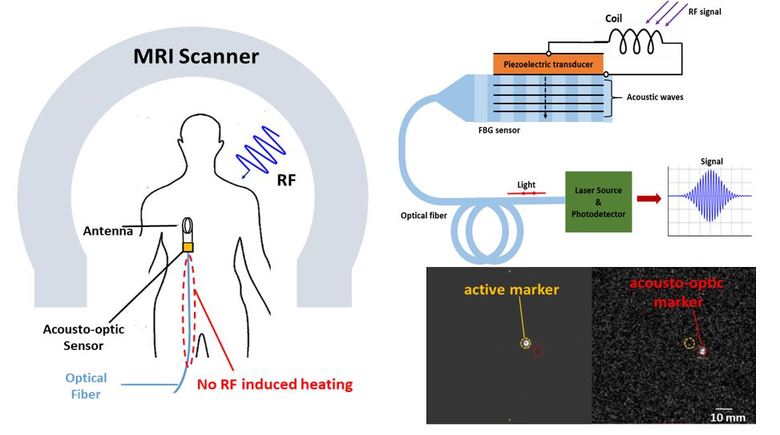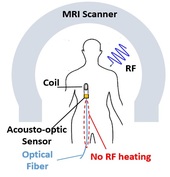
RF induced heating is a significant safety concern for Magnetic Resonance Imaging (MRI) especially when long metallic structures are inserted in the body during interventional MRI procedures. Current position tracking sensors used during interventional MRI rely on long conductor cables to carry local MRI signal from coils to the MRI system. In this work, a novel acousto-optic sensor with optical fiber connection is presented to eliminate RF induced heating. The acousto-optic sensor consists of a coil antenna, a piezoelectric transducer and a fiber Bragg grating (FBG) sensor at the distal end of an optical fiber. An external laser is coupled to the FBG sensor and the reflected light is monitored by a photodetector. The received MRI signal through the coil is converted to acoustic waves in the optical fiber by a piezoelectric transducer. The piezoelectric transducer is electrically connected to the coil and mechanically connected to the optical fiber sensor. Acoustic waves in the FBG region of the fiber modulates the reflected light intensity, which is converted to electrical signal by a photo-detector at the proximal end of the optical fiber and fed to the transceiver coil plug of the MRI scanner. Acousto-optic sensor was tested under a 1.5T MRI system using Gradient Echo (GRE) sequence. A gel phantom is used to simulate human body. SNR of the captured RF signal during the RF transmit of GRE is 57 dB for 90o flip angle. Visibility performance of the sensor was compared to an active marker with an identical tuned coil connected to a coaxial transmission line. With the promising initial results, this acousto-optic sensor platform offers a safe catheter tracking method for interventional MRI procedures.

